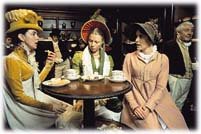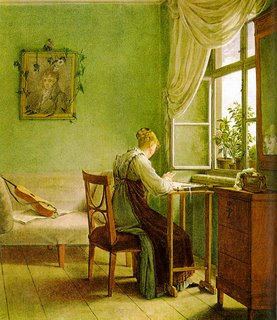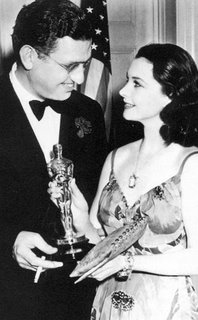Since I found so much interesting info (interesting to me, anyway!) on the lives of Georgian ladies-in-waiting, I decided to do a Part Two this week, continuing from last Monday.
The Countess of Harcourt became a Lady of the Bedchamber to Queen Charlotte in 1784, and she also became one of the Queen’s few friends, staying with her until her (Charlotte’s) death in 1818. Lady H. recalled one occasion when she said to the Queen, “I should like to tell YOU something, but pray promise never to let the QUEEN know it.” The Queen laughed and answered, “Oh, no, SHE can have no business with what passes between us in our private unreserved conversation.” But these lighthearted moments were an exception in what was considered a very dull Court indeed.
The Queen would receive at Court only women of unblemished reputation, “proscribing from her society all females of bankrupt or even ambiguous character” (Anne Somerset, from “Ladies in Waiting”). I don’t think ladies of, shall we say, a more risky disposition could care too much about this exclusion. The Court was no longer a center of fashion, as it had once been, since the values espoused by the King and Queen were so far from those set by the leaders of fashion.
The Court was also bound by rigid, uncomfortable etiquette. Fanny Burney, the novelist and sometime lady-in-waiting, wrote after first visiting Court, “In the first place you must not cough…In the second place you must not sneeze. In the third place, you must not, upon any account, stir either hand or foot. If, by chance, a black pin runs into your head, you must not take it out. If the pain is very great you must be sure to bear it without wincing; if it brings the tears into your eyes, you must not wipe them off…”
Other rules include one forbidding anyone to initiate a conversation with the King or Queen, or to eat in their presence. Ladies could not leave the Queen’s presence of their own accord, and when they did leave they had to back smoothly out of the room (with a train!). No one could sit in the Queen’s presence, even if faint or pregnant.
Of course, their duties could have been worse. The Ladies of the Bedchamber didn’t have to wait on the Queen at meals or assist with her toilette, aside from ceremonial; duties such as fastening her necklace. There were six of these ladies, drawn from the highest reaches of Society, each on call for two months of the year, usually only for formal occasions. The more day-to-day duties were now divided between the two Keepers of the Robes and their assistants, the wardrobe women (a whole ‘nother article, I think!). Ladies of the Bedchamber were paid 500 pounds a year (rather unfairly, the hardworking Keepers got only 200, but they did have free accomadations). Though the King and Queen were always eager to reduce their domestic budget, the Queen, despite a reputation for parsimony, would never permit savings at the expense of her ladies. She even fought the Government’s efforts to reorganize financial arrangements in 1812, condemning their proposed cuts as “shabby.”
Now, last week I asked if YOU would make a good lady-in-waiting. This week I wonder would your own heroine (or the heroine of your favorite books) do well at Court? Or would they be too rebellious? 🙂






